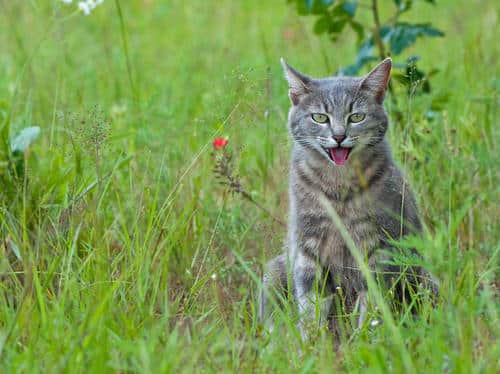If you have an older cat with increased appetite, but also with weight loss, then there is a chance that he is suffering from hyperthyroidism. This is a prevalent disease for the cat, primarily affecting middle-aged to older felines.
Hyperthyroidism is an illness that occurs in cats. Usually, your feline will be over the age of ten. He will have an increased appetite but will be losing weight. Her fur will sparse, and he might be urinating more often. He will indicate muscle loss. He might be able to feel an enlarged thyroid gland beside his Adam’s apple. His heart rate will be elevated.
In hyperthyroidism, the thyroid gland expands and produces too much of thyroid hormone. This speeds up the metabolism of your cat, producing the symptoms of weight loss, improved appetite, elevated heart rate, and high blood pressure.
This illness is diagnosed based on a vet test, and in many cases expands thyroid glands can be palpated on either side of the cat’s windpipe. Improved blood pressure and high heart rate point towards hyperthyroid illness. A chemistry panel measuring thyroid hormone (T4) can verify the verdict of hyperthyroidism.
One of the most effective and safest ways to cure this disease is with radioactive iodine. Your cat will be given one dose of radioactive iodine which selectively targets the abnormal thyroid cells. It needs a specialized licensed facility, and can just be done at a few referral practitioners.
Surgery is a possible option, but based on the risk of hypocalcemia and anesthetic issues in older cats, it is rarely done.
Most cats with hyperthyroidism are treated with a conventional medication also known as methimazole, but the treatment has side effects. First medication should be given at least every day, normally 2 times a day and this can be a challenge. Fifteen percent of cats have some form of side effect, usually diarrhea, inappetence, and vomiting. Some can have allergic-type reactions.
Carnitine is a supplement which is efficient in reversing the symptoms of hyperthyroid disease in people. The starting cat dose is 250 mg a day.
Bugleweed and Melissa (Melissa officinalis) are two herbs that have been utilized in combination to fight the effects of hyperthyroid disease. Bugleweed has been revealed to reduce thyroid hormone levels in rats 24 hours after administration. The standard dose is one drop for every pound of body weight of the tinctures given 2 times a day.
Conclusion : Hyperthyroidism is a common illness and has some classic symptoms of increased appetite, accompanied by weight loss which all feline owners must be aware of all the time. The cause is due to the overproduction of thyroid hormone by the thyroid gland, and the diagnosis is relatively simple with a blood test measuring T4. There are three primary conventional treatments, but the most common one is methimazole. However, it produces side effects. Luckily, there are some specific holistic options for you to think about,
